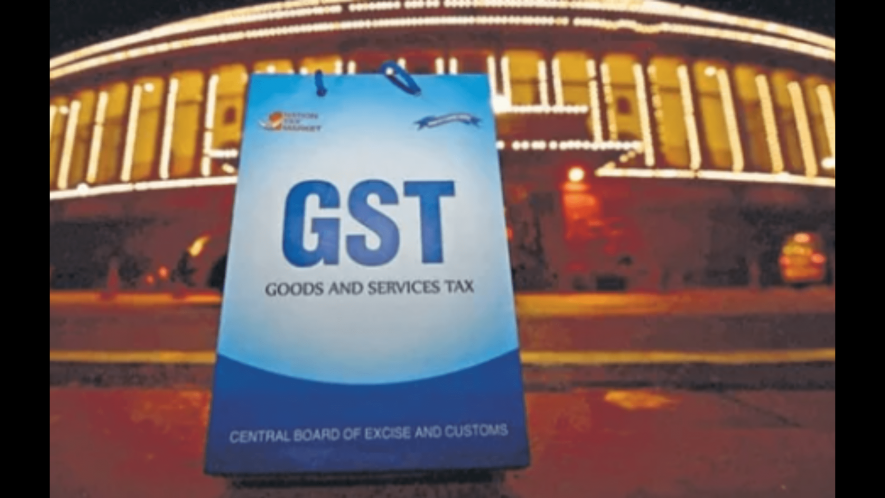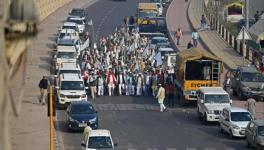Kerala Demands Higher Share of Tax Revenue, GST From Centre

Image Courtesy: PTI
Union finance minister Nirmala Sitharaman’s recent remark in Parliament that only Rs 780.49 crore of Goods and Services Tax (GST) compensation was pending to Kerala, has raked up another round of discussions in the on the very implementation of the single tax regime, the compensation and the concerns of state governments.
K N Balagopal, the finance minister of Kerala, joined the issue highlighting the loss of revenue for states and the need to increase the states’ share of GST from the Centre. The reduction in allocation to Kerala in the 15th Finance Commission has also affected the state, together with the revenue setbacks due to two years of historic floods and COVID-19 pandemic, he said in recent Facebook post.
The government of Kerala has been demanding the relaxation of norms for borrowing and increase in revenue deficit grants to propel the finances of the state. Several Bharatiya Janata Party (BJP) ruled states have voiced similar opinions pertaining to GST.
In fact, the BJP was opposed to the implementation of the GST, when an amendment was proposed in Parliament in 2011.
DENIAL OF EXTENSION AFFECTING STATES
Sitharman was replying to a question by Congress MP, Shashi Tharoor, in the Lok sabha on GST compensation dues pending to his home state, Kerala, during the recently concluded Winter session. He had pointed out that Kerala was yet to receive Rs 4,486 crore for the year 2017-18.
In his FB post, Balagopal said: “The GST compensation to the states ended in June 2022. The compensation was paid to make up for the loss in revenue for the states due to the implementation of the GST. Kerala is losing around Rs 12,000 crores per year with the end of GST compensation period”.
Several states, including those ruled by BJP and its allies have demanded extension of GST compensation, but the Union government has turned down the possibility, thereby impinging on the states’ right to taxes.
“GST was an erroneous policy proposition to begin with. It is fundamentally undemocratic to take away the taxation rights of the states. The states have the rights and responsibilities to handle policy decisions regarding a large number of important sectors, including public health, education, agriculture, and law and order”, Subin Dennis, economist and researcher, told NewsClick.
CUMULATIVE LOSS OF RS 20,000 CRORE
In his post, Balagopal said that apart from the discontinuation of GST compensation, the inclusion of non-budgetary loans taken by the Kerala Infrastructure Investment Fund Board (KIIFB) and Social Security/Welfare Fund Board being included in the public borrowing has limited the borrowing capacity of the state.
“Due to this inclusion Kerala is unable to avail loans of about Rs 12,500 crores, with a loss of Rs 3,140 crores in the current financial year alone”, he wrote.
The minister also estimated a shortfall in revenue deficit grants of about Rs 6,700 crore. “Everything put together, the state has recorded a shortfall of Rs 24,000 crores this year. The union government must address concerns on this accumulated loss”, he said.
Kerala had suffered setbacks on economic growth due to the massive floods in 2018 and 2019, followed by the COVID-19 pandemic. With the Left Democratic Front (LDF) government in Kerala spending more on public infrastructure, education and healthcare, the revenue shortfall is said to have hit the state’s development.
Calling for protection of states’ rights, Balagopal said: “In the recently concluded GST council meeting, cutting across party lines, the demand was to ensure economic federalism. The country can move forward only by protecting the economic powers and constitutional rights of the states”.
Airing similar views, Dennis said: “Central governments in the recent decades have brought in various measures to take away states' rights to set their own priorities on economic policy, and GST has been the worst of these”.
INCREASE SHARE TO STATES
The 15th Finance Commission’s recommendations on allocations in the Central tax revenue pool and the divisive pool was flayed by Kerala government.
The states’ share of the Central tax revenue pool, which used to be 42% in the 14th Finance Commission, has now come down to 41%. Kerala’s share in the divisible pool has dropped from 3.875% (10th Finance Commission) to 1.925%. The State’s share of Central taxes, which used to be ₹19,038 crore, has been going down in the subsequent years, Balagopal had said then.
“This will further deal a blow to the state government”, he added.
Considering the share of expenses meted out by the state governments against the share of revenue received from the Union government, the states have demanded an increase in share from GST.
Dennis agreed. “Given the huge shortfall of revenue that has hit many states as a result of the implementation of GST, it stands to reason that the proportion of revenues from GST that is handed over to the states should be increased”, he added.
The minister also claimed that 64% of the public expenditure is met by the state governments, while they receive only 37% of the tax revenue.
Endorsing his view, Dennis said: “Finance Ministers of many states have demanded that states' share should be increased to 60% from the current level of 50%. This is a perfectly reasonable and just demand”.
Get the latest reports & analysis with people's perspective on Protests, movements & deep analytical videos, discussions of the current affairs in your Telegram app. Subscribe to NewsClick's Telegram channel & get Real-Time updates on stories, as they get published on our website.
























